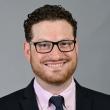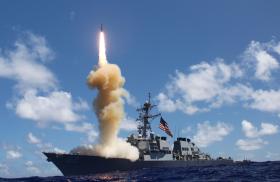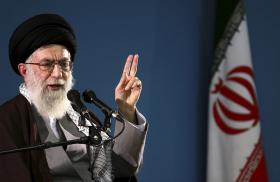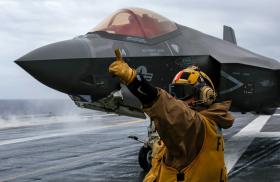- Policy Analysis
- PolicyWatch 4036
Syria Trip Report: Next Steps for U.S. Policy
Watch or read an in-depth conversation with three experts who have spent weeks on the ground in Syria and met with the interim authorities who toppled the Assad regime.
On May 7, The Washington Institute held a virtual Policy Forum with Aaron Y. Zelin, Caroline Rose, and Gareth Browne. Zelin is the Institute’s Levy Senior Fellow and author of the book The Age of Political Jihadism: A Study of Hayat Tahrir al-Sham. He recently traveled throughout Syria, meeting with individuals in Damascus, Suwayda, Homs, Hama, and other areas. Rose, a program director at the New Lines Institute for Strategy and Policy, recently met with government officials, religious figures, and civil society leaders in Damascus. Browne, a Middle East correspondent with the Economist, has reported from Syria since the regime’s fall. The following is a rapporteur’s summary of their remarks.
Aaron Zelin
Five months into the post-Assad era, conditions on the ground point to three takeaways. First, despite high-profile clashes at times, overall security seems well-managed in many parts of the country, including during the recent Easter holiday festivities. The capital’s Shia suburb of Sayyeda Zainab stood out as having a particularly robust security presence, likely due to the threat of terrorism against the neighborhood’s major Shia shrine. Second, the level of destruction nationwide is staggering, and reconstruction will likely cause additional displacement in the short term, since many people are currently residing in structurally compromised buildings. Third, personal interactions with the new interim bureaucracy indicate that Foreign Minister Assad al-Shaibani is playing a central role in domestic politics, with many decisions routed through his Political Affairs Directorate.
Going forward, one of the most important post-Assad tasks—establishing a government monopoly on weapons—will be easier said than done given the country’s history of violence and the persistent concerns voiced by minority groups. So far, the new government has been reacting to violent crises rather than proactively shaping policy. The latest such crisis erupted last week, when an alleged blasphemous comment sparked clashes in Jaramana, a Druze neighborhood in Damascus. The incident was quickly revealed to be more complex than a simple sectarian dispute, with former regime elements playing an active role. Moreover, the Syrian Druze community is not monolithic—while some sheikhs are actively working with the new government, others have been loudly critical (e.g., Hikmat al-Hajri).
In the northeast, finalizing integration between the interim government and the Kurdish-led Syrian Democratic Forces (SDF) will likely be a protracted process that extends well beyond its ambitious one-year timeline. To put this goal in perspective, Hayat Tahrir al-Sham (HTS)—the group that leads the new government—needed more than two years to consolidate control over its past stronghold in the northwest. Both sides have made notable progress by organizing subcommittees and expanding the presence of government forces in Kurdish neighborhoods in Aleppo, the Tishrin Dam area, and western Deir al-Zour. Yet the bulk of the challenge still lies ahead. Integrating Hasaka will be significantly more difficult since it is a Kurdish-majority province. Moreover, the SDF and its civilian apparatus, the Democratic Autonomous Administration of North and East Syria, have accumulated substantial local administrative experience for more than a decade, and their vision for the future ultimately differs from the interim government’s.
Lastly, Damascus has made strong efforts to meet U.S. demands on countering terrorism, curbing drug smugglers, and destroying the former regime’s chemical weapons. The removal of foreign fighters remains a sticking point, however. Authorities have addressed some problematic HTS elements, such as the Uzbek jihadists who torched a Christmas tree in the Hama area last December, and the Egyptian fighter Ahmed al-Mansour, who called for the overthrow of President Abdul Fattah al-Sisi. Yet they have not removed foreign fighters from positions in the new Ministry of Defense.
Caroline Rose
Despite being overloaded and under-resourced, the interim government has managed the incredible feat of launching an international diplomacy campaign while balancing an array of domestic demands. As a result, the new Syria has a roadmap and strategy, but authorities are struggling to execute it.
At times, this capacity issue has delayed the government’s response to outbursts of violence, as seen in Tartus and Latakia in March. The reaction to more recent clashes in Jaramana was faster and more effective, indicating that the government is learning from its mistakes. Yet minority groups remain concerned, and authorities are stretched too thin to prevent all such incidents. Thus, low-scale violence is expected to continue.
The government is also still at odds with the Kurds, failing to reach consensus on even the most basic principles of governance. The breadth of options aired so far—from a federalist system to an Iraqi Kurdistan model to a Kurdish security force—illustrates this problem, putting the negotiations at risk of souring at any moment with no framework to fall back on. Failure to coordinate and implement a coherent integration plan would be a missed opportunity for both sides, especially given the SDF’s proven security credentials and the Islamic State’s active efforts to regain a foothold in the northeast.
As for U.S. relations, the interim government has taken steps to address several of the eight preconditions that Washington has laid out for sanctions relief. If U.S. and allied officials want to see more progress on the foreign fighter issue, however, they will need to provide clarification, guidance, and engagement to help Syrian officials navigate their tricky removal. After all, many of these foreigners are well-trained fighters capable of mounting significant armed resistance against a government already operating under considerable strain.
Gareth Browne
Syria has undergone striking changes since Bashar al-Assad’s ouster. The initial days of the revolution fueled euphoria, and people enjoyed the political freedom to speak openly for the first time in years. Yet this sentiment has faded as the realities of crippling poverty and sanctions continue squeezing the life out of Syria.
The interim authorities have strong control of Syria’s “spine” between Idlib and Damascus, thanks in part to the government’s absorption of non-HTS figures. To facilitate this absorption, officials framed the violence on the coast and in the south as a justification to urgently integrate remnant factions. After major clashes in Deraa, for example, Ahmad al-Awda, leader of the “8th Brigade” faction, agreed to integrate his forces into the Ministry of Defense. Similarly, some Druze fighters joined the government after clashes in Jaramana.
As debates continue over the presence of foreign fighters, one must keep in mind that President Ahmed al-Sharaa feels a sense of personal loyalty to most of them. In many cases he does not have the luxury of choice—until Syria’s economic and security situation stabilizes, he will need to rely on problematic actors to a certain degree. To compensate for this reality, the government has assigned non-HTS technocrats to key positions and named Osama Rifai, an outspoken critic of Sharaa’s group, as Grand Mufti of Syria.
Indeed, the new leaders generally understand their constraints and act pragmatically. This includes their handling of the northeast, where the Kurds will likely retain some forms of control even if it is not called “federalism.” Sharaa’s circle has little appetite to move into such regions by force. He has also allowed U.S. counterterrorism efforts to continue unobstructed, including regular strikes against Huras al-Din, al-Qaeda’s faltering local branch. Perhaps most remarkable of all is the leadership’s openness to engagement with Israel and restraint toward its cross-border military activities—though if domestic pushback continues to mount against these incursions and airstrikes, Sharaa may have to change his stance.
This summary was prepared by Audrey Kost. The Policy Forum series is made possible through the generosity of the Florence and Robert Kaufman Family.





